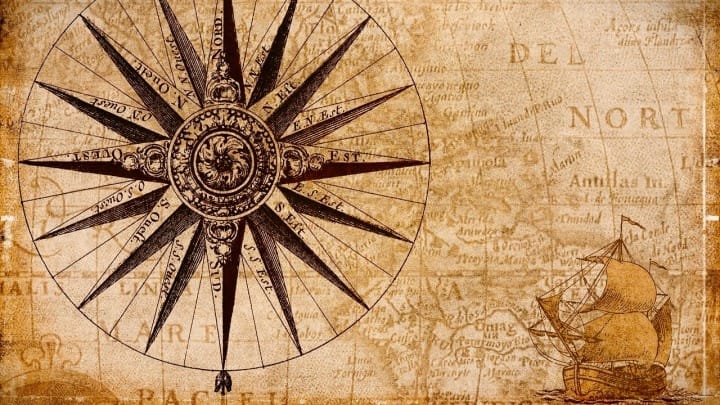What is your Compass?
‘Compass’ comes from Old English and French, and is based on the Latin word – compassus – meaning: a circle or circuit, a limit, a way, or a route. The first magnetic compass was invented in China more than 2000 years ago. And the first mariner’s compass was used in Europe about 700 years ago. The word is steeped in our language and often used as a metaphor. For example, people might describe their ‘moral compass’. Meaning the values they use as a guide to make decisions. ‘What is your Compass?’
- is it the values of your parents, or the school you went to?
- is it the opinion column of your favourite newspaper, political party, or social media blogger?
- is it your conscience – but what shapes that?
- is it the Bible or other sacred scriptures?
“It ain’t necessarily so…”
Even with the last one, this raises questions in our Post-Enlightenment, Post-Modern world? As far back as 1925 George Gershwin composed the Blues influenced opera, ‘Porgy and Bess’ in which one song puts the dilemma well:
“It ain’t necessarily so, it ain’t necessarily so. The things that you’re liable, to read in the Bible. It ain’t necessarily so.”
Smartphones & Pocket Watches
For many people today their compass might well be in their pocket or handbag. It is an attractive, almost indispensible, box of tricks called the smartphone. In 2018, OFCOM research revealed that British people of all ages checked their smartphones an average of once every 12 minutes. But is that a Compass, or is it just looking for distraction? There is a difference, and it is a very human condition. So much so, that a new word is creeping into our ever-evolving English language. ‘Phubbing’ which is short for ‘phone snubbing’. Are you a phubber? Have you ever been phubbed?

Of course, avoidance and distraction pre-existed smartphones. Maybe we can trace it back as far as Adam and Eve. There they were, hiding from God in the Garden of Eden. Avoiding the naked truth before their Creator. Samuel Pepys, the diarist, once chastised himself over his distracting habit. Not with a smartphone, but the new gadget of his era, the pocket watch. While travelling in a coach Pepys realised he was checking his watch every 10 minutes and in a diary entry from May 1665, wrote:
“Lord! to see how much of my old folly and childishnesse hangs upon me still that I cannot forbear carrying my watch in my hand in the coach all this afternoon, and seeing what o’clock it is one hundred times, and am apt to think with myself, how could I be so long without one; though I remember since, I had one, and found it a trouble, and resolved to carry one no more about me while I lived.”
It is interesting to reflect for a moment that checking our smartphones every 12 minutes today, or pocket watches every 10 minutes 350 years ago, seems socially acceptable. But this is not true if people checked their Bibles or other sacred scriptures, that often. They would probably be labelled as zealots, or fanatical. ‘Bible Bashers’ is the common misnomer used against Christians.
Charting the Way
For the ‘Word of the Lord’ to mean something in an age that sings, ‘It ain’t necessarily so…’, it’s good to remember the ‘Word of the Lord‘ isn’t just the words on the page. Christianity, for example, has never regarded scripture as the dictated word of God, but the inspired word of God. So when we read it, we need different lenses. Parts of the Old Testament date from the Bronze Age.
Unchanging is the central person of Jesus Christ, and as Marcus Borg, a biblical scholar, put it so well – Jesus is the lens through which we read the Scriptures. For Christians, Jesus is God’s Word made flesh – he is the Compass of our lives. It is no accident to me that Jesus says, ‘Follow me’, or when he says, ‘I am the Way, the Truth, and the Life.’ I do not read these words as a mandate to exclude all those who are different from me to eternal damnation. Instead, I read them as an invitation to be open in a Christlike way to a world filled with the possibilities of God. This seems more important now in an age which appears to crave:
- ‘strong’ leaders promoting intolerance as a definitive answer
- inertia in the face of global issues such as climate change
- agression and violence as a first resort, instead of the last
I have recently read a book by the English philosopher, John Gray, The New Leviathans. It is a reflection on our times through the lens of the 1651 work, Leviathan, by Thomas Hobbes – a contemporary of Samuel Pepys. The most challenging part of Gray’s book for me is encapsulated in one of the last paragraphs in which he says:
“The real Leviathan is the human animal. Hobbes believed it was driven by self-preservation: humans go on until the world brings them to a stop. He failed to see that death can come from within. Nothing is more real than the nothingness within human beings. Alone among living creatures, they know their lives are bounded by death. Awareness of their mortality impels them to seek immortality in ideas. Killing for the sake of words gives meaning to their lives. In this key exercise the privilege of absurdity, which cannot be renounced. There is another way of exercising this privilege. The nothingness within may impel action in the service of life.”
Recalibrating for a Happy New Year
Gray’s words make for sober reading. And yet hope tinges the last part of his message where he invites us to render our ‘actions’ to the ‘service of life’. For those of all creeds and none, Gray provides a positive challenge. The turning of the year is often a time when many of us look back and look forward. It is a time when well intended resolutions for the new year are made. I always think it is a good opportunity to recalibrate my personal Compass. Sometimes that is easier to say than to do. But it is always a wortwhile exercise. It reminds me that I alone, am not the Compass, and that I should choose one and maintain it, wisely. Call this a resolution for encompassing the new year, if you like. Whatever your thoughts, perhaps the one question to ask yourself is, ‘What is your Compass?’


